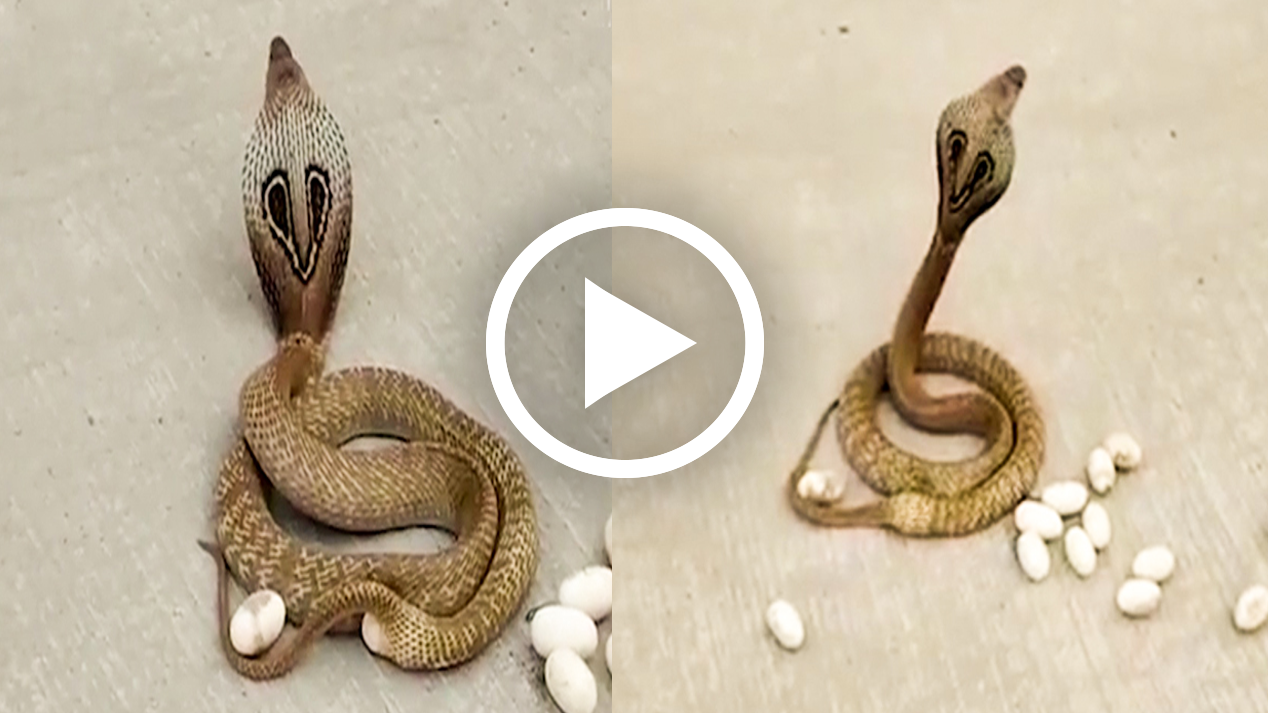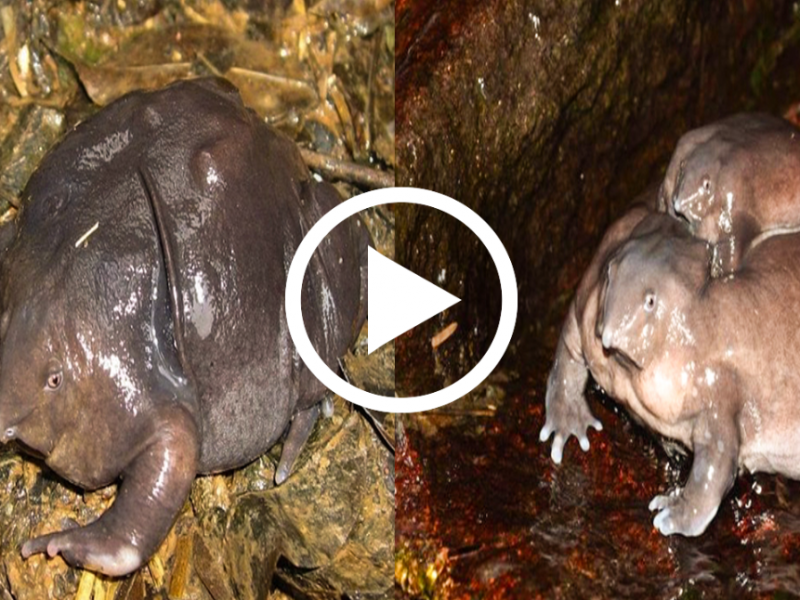This is the stunning moment a cobra lays eggs on a busy street in South India. As shocked people watched, the pregnant snake laid 14 eggs in less than an hour. A teacher in Maddur in Karnataka spotted the cobra inside his home and called in Prasanna, a local snake expert, to ʀᴇsᴄᴜᴇ the snake. But before the snake catcher could arrive for ʀᴇsᴄᴜᴇ , the cobra slithered into the street and started laying eggs.
 Not one or two but 14 eggs. This snake gave birth to them in less than an hour, leaving passersby stunned. Later, Prasanna caught the snake and released it into a nearby forest, he brought the eggs and said that the snakes will be released after they hatch.
Not one or two but 14 eggs. This snake gave birth to them in less than an hour, leaving passersby stunned. Later, Prasanna caught the snake and released it into a nearby forest, he brought the eggs and said that the snakes will be released after they hatch.
After being brought back to the forest, it is possible that this cobra will lay a few more eggs.
 Cobras reproduce by laying eggs. The egg can be seen moving down the snake’s muscular body towards the vent where the eggs are laid. Females typically lay 20 to 40 eggs at a time, which incubate between 60 and 80 days. According to India’s SnakeWorld, cobras will stay near the eggs and defend them until they hatch. Wild boars and mongooses are known to sᴛᴇᴀʟ cobra eggs.
Cobras reproduce by laying eggs. The egg can be seen moving down the snake’s muscular body towards the vent where the eggs are laid. Females typically lay 20 to 40 eggs at a time, which incubate between 60 and 80 days. According to India’s SnakeWorld, cobras will stay near the eggs and defend them until they hatch. Wild boars and mongooses are known to sᴛᴇᴀʟ cobra eggs.
 Cobras are Elapids, a type of poisonous snake with hollow fangs fixed to the top jaw at the front of the mouth. These snakes cannot hold their fangs down on prey so they inject venom through their fangs, according to the San Diego Zoo. They have an excellent sense of smell and night vision. In addition to their trademark hoods, cobras have round pupils and smooth scales.
Cobras are Elapids, a type of poisonous snake with hollow fangs fixed to the top jaw at the front of the mouth. These snakes cannot hold their fangs down on prey so they inject venom through their fangs, according to the San Diego Zoo. They have an excellent sense of smell and night vision. In addition to their trademark hoods, cobras have round pupils and smooth scales.
 Cobra bites can be ꜰᴀᴛᴀʟ, especially if left untreated. Fortunately, antivenin is available and sometimes lives can also be sᴀᴠᴇᴅ with the use of an artificial respirator. The venom ᴀᴛᴛᴀᴄᴋs the victim’s central nervous system, leading to ᴘᴀɪɴ, blurred vision, dizziness, drowsiness, and eventually paralysis.
Cobra bites can be ꜰᴀᴛᴀʟ, especially if left untreated. Fortunately, antivenin is available and sometimes lives can also be sᴀᴠᴇᴅ with the use of an artificial respirator. The venom ᴀᴛᴛᴀᴄᴋs the victim’s central nervous system, leading to ᴘᴀɪɴ, blurred vision, dizziness, drowsiness, and eventually paralysis.
 If the condition is severe, the poison enters the circulatory system, the ᴠɪᴄᴛɪᴍ falls into a coma. Rapid ᴅᴇᴀᴛʜ from respiratory failure. Furthermore, the ᴠɪᴄᴛɪᴍ may have renal failure according to some experimental bite observations, although this possibility is uncommon. The bite of a king cobra can lead to rapid ᴅᴇᴀᴛʜ in just 30 minutes. However, this snake rarely bites humans and not all bites are poisonous.
If the condition is severe, the poison enters the circulatory system, the ᴠɪᴄᴛɪᴍ falls into a coma. Rapid ᴅᴇᴀᴛʜ from respiratory failure. Furthermore, the ᴠɪᴄᴛɪᴍ may have renal failure according to some experimental bite observations, although this possibility is uncommon. The bite of a king cobra can lead to rapid ᴅᴇᴀᴛʜ in just 30 minutes. However, this snake rarely bites humans and not all bites are poisonous.
 Today, the number of cobras has decreased significantly due to habitat ʟᴏss in many places. Humans clearing forests to harvest wood, get arable land or expand settlement land has seriously affected the species’ habitat.
Today, the number of cobras has decreased significantly due to habitat ʟᴏss in many places. Humans clearing forests to harvest wood, get arable land or expand settlement land has seriously affected the species’ habitat.


